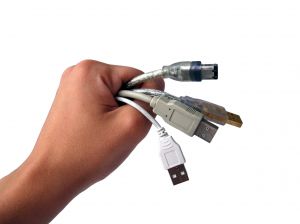Last Updated on April 20, 2020
This is a guest post by Skellie. If you run a website or blog you might be interested in reading her tips and tutorials on creating better content. You can find them at Skelliewag.org.
 If your computer is running slowly, not doing what you want it to, and taking forever to start up, you might be in need of some beginner PC care. If you consider yourself a bit of an expert, however, you’ll probably already be familiar with the points in this article. Perhaps you could pass it on to someone who is less tech savvy?
If your computer is running slowly, not doing what you want it to, and taking forever to start up, you might be in need of some beginner PC care. If you consider yourself a bit of an expert, however, you’ll probably already be familiar with the points in this article. Perhaps you could pass it on to someone who is less tech savvy?
In this post, I want to suggest some very basic ways you can look after your PC. Set aside a few hours and follow the steps suggested here. You should find that your PC runs quicker, more smoothly, and is generally more stable. The instructions are written for Windows XP but should apply to Vista, also.
1. Make sure your Windows firewall is ‘ON’
This is the most important way to protect your PC from viruses and other nasties.
Browse to ‘Network and Internet Connections’ in the Control Panel, then click ‘Network Connections’ and right click on your internet connection when it appears.
Select ‘Properties’, then browse to the ‘Advanced’ tab and tick the internet connection firewall box.
2. Delete programs you don’t use
This is an important way to free up space on your computer and to get rid of programs that are slowing you down and using up your computer’s resources.
Go to the Control Panel and select Add / Remove Programs. This will create a list of all the things you have installed on your computer. Delete the programs you know you don’t use. If you’re unsure about what something is then it’s best to leave it — just in case it’s actually important!
3. Run Disk Cleanup
This can be found through the Start menu. Select All Programs –> Accessories
–> System Tools –> Disk Cleanup. This will help maximize free space and make your data storage tighter.
4. Get rid of junk
You know — the random detritus we collect as we use our PC on a day-to-day basis.
Most of us chuck everything we download into a folder, just in case we need it again. These folders can take up a surprising amount of space. Go through your stuff and delete everything you don’t need. You could burn things you might need to DVD in order to keep them safe while freeing up more space on your PC.
5. Run Disk defragmenter
If you’ve never done this before your PC’s files will be all over the place, making it much harder for your PC to link necessary files together. In other words, this makes your computer slower. Select All Programs –> Accessories –> System Tools –> Disk defragmenter and select ‘Defragment’ for all the drives you are storing data on (most people have just one). This can take a while so go have a cup of coffee. By now, you’ve earned it.
6. Do a virus check
Most people seem to have Norton Anti-virus but this isn’t a program I recommend. I have friends who use this and the program constantly pops up, nagging them about certain things. It’s very annoying.
I recommend downloading three free programs: AVG Anti-Virus Free Edition, AVG Anti-Spyware Free Edition and AVG Anti-Rootkit Free Edition — all of them are available here. I’m using these three programs on the computer I’m writing this post on and I never have trouble with viruses.
Do a thorough scan of all your drives with each of those programs (or your anti-virus program of choice). Make sure you allow the program to download updates first. This helps it to catch more recent threats.
7. Stop unwanted programs running at start up
In the bottom right-hand corner of the screen you will see the time and, next to it, some little icons. These are programs and processes that are constantly running in the background and will start at the same time as Windows. They can use up valuable resources and make your computer run more slowly.
Check that you actually need all of these programs switched on all the time. Some of them you will use but can choose to run them only when you need them. To stop a program beginning when Windows starts, find the program’s ‘Options’ panel and deselect ‘Run when Windows starts’. Easy, no?
Little by little or all at once
These tips should have your PC running faster, more smoothly and more safely. You could approach the list as a long-term project, implementing one tip each week, or set aside an afternoon and do them all at once.
I recently followed all these steps with my friend’s laptop and she says it’s working much better now. I hope they’re just as useful to you.




While a computer scan immediately after installing and AV software is crucial, doing a weekly or every two weeks scan is also recommended. As for updates, I love applications with automatic and very frequent updates. Up to know, when it comes to adding updates and heuristics, I still prefer BitDefender, the AV I used to work for.
I would add a different recommendation though 😛 Use a dual boot with a Linux Distro 😛
When i tried to burn my photos on to CDs i found that even forvery less content it was taking very long. Since i dont know much about computers, i googled for the problem, and one of this was one of the ‘symptoms’ when the HDD is afflicted by the ‘fragmentation disease’ it said. I analyzed my drive and it does seem to be fragged.
Thanks, Alina, I liked your recommendations (especially the last one 🙂 ). As of AV software, I prefer Trend Micro’s PC Cillin. I have set it to perform weekly computer scans and I’ve got no incident so far. The worst experience I had, was with Norton AV (and I’m sure I’m not the only one).
Yes Ruben, this can be a cause of your problem. Did it work better after defragmentation?
Running disk cleanup and defragging regularly (~ per week or so) is good practice for maintaining your PC. If you are a power user, then maybe defrag every 2-3 days. These days I use Diskeeper Professional for defragmenting. It has an automatic mode that is very convenient – just switch it on and forget about it, diskeeper automatically analyzes and defragments my drives when fragmentation has crossed a critical threshold. Good software.
Hey, Apollo, thanks for the tips. I defragment weekly. As far as I’ve noticed, using WordPress leaves a lot of strange files in the computer.
A little addition about Windows XP built-in firewall. It even can’t filter any outobund traffic! So, in case of security, I prefer to use time-proved Agnitum Outpost Security Suite. With all its firewall, anti-virus, anti-spam, anti-spyware I feel myself well secured while online on my laptop.
I need to comment about the firewall advice:
First, you should never, ever be relying 100% on a software firewall on your PC. You should always be using an external firewall that sits between your internet connection and your pc(s). Nothing wrong with using both, but the external is critical.
Second, mis-configured local firewalls can be the *source* of problems, so temporarily shutting them off is an important debugging too.
Also: defragging? Hardly ever necessary nowadays, and the defrag tool it self will tell you that if you ask it to “analyze”. Almost always it will say you don’t need to defrag..
Hi Anthony, thank you for your input. I didn’t know how important is to use two firewalls. I’m using an external one only because my router has it, but I had no idea I needed it.
As of defrag, my tool almost always says I need to do it (probably I use some programs which fragment the files a lot).
Thank you, Skellie, for your advice on how to better care for my computer!
One place I go to when I have problems with my PC is called Geeks To Go. Those folks are very helpful and great to work with. You can find them at http://www.geekstogo.com/forum/
Or, just get a mac.
None of the points above would improve your system on a mac because there is nothing that would slow down your Computer.(except the firewall, but who needs software firewalls anyway..)
Sorry, I did it again when I was a PC usere some years ago I hated thes guys who postet just to say how much better a mac is, until I said to myself lets give it a try. Now, I would never switch back.
If you defragment weekly/too often, you’re just going to give the hard disk unnecessary wear and tear. Use a program like Smart Defrag 1.11 to at least see what the fragmentation status is, and go from there.